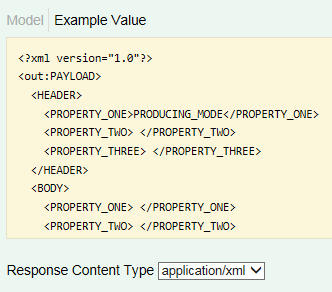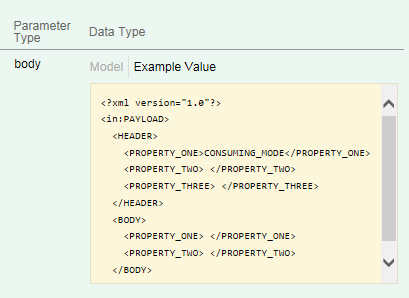Using Swashbuckle to Generate Arbitrary XML Example Values
These notes follow a previous entry, “Using Swashbuckle to Support Swaggerfied XML Production and Consumption,” continuing to challenge of producing Swagger UI output like this:
and this:
The way this is done is by building a new Swashbuckle.Swagger.Schema and using it on Response.schema for Swagger produces and Parameter.schema for Swagger consumes. These operations can be tacked on the end of the blocks of code we saw earlier in IOperationFilter.Apply().
I have centralized this code in extension methods. So, for consumes, I have this extension method:
public static Parameter WithAbbreviatedSchema(this Parameter parameter)
{
if (parameter == null) return null;
if (parameter.schema == null) return null;
parameter.schema.SetAbbreviatedSchema(isConsumingSchema: true);
return parameter;
}
For produces, I have:
public static Response WithAbbreviatedSchema(this Response response)
{
if (response == null) return null;
if (response.schema == null) response.schema = new Schema();
response.schema.SetAbbreviatedSchema(isConsumingSchema: false);
return response;
}
This simple pattern I am showing leads to, “What the hell is SetAbbreviatedSchema()?” Here is the answer:
public static void SetAbbreviatedSchema(this Schema schema, bool isConsumingSchema)
{
if (schema == null) return;
var oneSpace = " ";
var sendingPartyId = isConsumingSchema ? "CONSUMING_MODE" : "PRODUCING_MODE";
var topLevelTitle = isConsumingSchema ? "in:PAYLOAD" : "out:PAYLOAD";
schema.properties = new Dictionary<string, Schema> {
{
"HEADER",
new Schema
{
properties = new Dictionary<string, Schema>
{
{ "PROPERTY_ONE", new Schema { type = "string", example = sendingPartyId } },
{ "PROPERTY_TWO", new Schema { type = "string", example = oneSpace } },
{ "PROPERTY_THREE", new Schema { type = "string", example = oneSpace } },
},
type = "object"
}
},
{
"BODY",
new Schema
{
properties = new Dictionary<string, Schema>
{
{ "PROPERTY_ONE", new Schema { type = "string", example = oneSpace } },
{ "PROPERTY_TWO", new Schema { type = "string", example = oneSpace } },
},
type = "object"
}
}
};
schema.title = topLevelTitle;
schema.type = "object";
}
All of these extension methods are wonderful but Swashbuckle will ignore all of this work for consumes unless we make sure that Parameter.schema.@ref is set to null. This, for me, leads to a final extension method:
public static Parameter WitNullSchemaReference(this Parameter parameter)
{
if (parameter == null) return null;
if (parameter.schema == null) return null;
parameter.schema.@ref = null;
return parameter;
}
We can now return to the implementation of IOperationFilter, SwaggerContentTypeOperationFilter, from my previous post with its ApplyConsumption() method:
static void ApplyConsumption(SwaggerContentTypeAttribute swaggerAttribute, Parameter swaggerParameter)
{
switch (swaggerAttribute.Tag)
{
case "ConsumeXml":
swaggerParameter.WitNullSchemaReference().WithAbbreviatedSchema();
break;
}
}
and its ApplyProduction() method:
static void ApplyProduction(SwaggerContentTypeAttribute swaggerAttribute, Operation operation)
{
Response okResponse = null;
switch (swaggerAttribute.Tag)
{
case "ConsumeXml":
okResponse = new Response()
.WithOkDescription()
.WithAbbreviatedSchema();
break;
}
if (okResponse != null) operation.responses.Add(okResponse.To200Pair());
}
Now, for the question, “What is going on with that topLevelTitle variable in SetAbbreviatedSchema()?” This question refers to this (shown above):
var topLevelTitle = isConsumingSchema ? "in:PAYLOAD" : "out:PAYLOAD";
This line is a hack to get around the current situation with Swagger/Swashbuckle where Schema definitions are considered duplicates when they have the same Schema.title.

